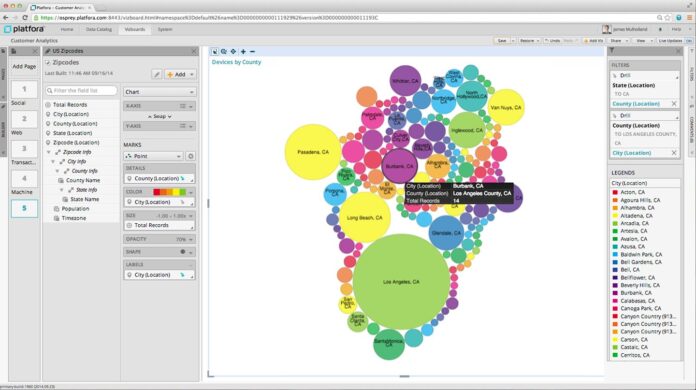Editor’s Note: The ecosystem of big data and analytics, and its intersection with mobile networks and cloud computing has increasing relevance to wireless in areas that include service assurance, customer experience management, mobile marketing, location-based services and more. Here is a look at the week’s big data news.
—Platfora said it is the first to launch an analytics solution specifically tailored for the “Internet of Things” and sensor data.
Platfora, which has a native big data analytics platform for Hadoop, said that its IoT solution will allow enterprise users to “work with machine and sensor data at scale without significant support from the IT department.”
Vivint, which offers smart home technology, already uses Platfora’s offering for enterprise data systems and its home automation devices that include home security and control as well as solar. Platfora said that in the course of product quality monitoring, Vivint was able to use Platfora’s sensor and machine data analytics to uncover a small manufacturer’s defect that was impacting a limited number of home systems that had not been able to be pinpointed with traditional analytics tools. Vivint was then able to send out technicians to solve the problem before most customers were even aware of it.
“Imagine IoT data as an iceberg. The challenge that organizations face is that the great majority of IoT data is below the waterline, which cannot be accessed by traditional analytics tools without long cycles of data preparation,” said Ben Werther, founder and CEO of Platfora, in a statement. “If you can’t easily work with data below the waterline, you cannot participate in the IoT era because it’s impossible to answer complex behavioral questions that arise when analyzing these new types of machine, transactional and customer-interaction data.”
Subscribe now to get the daily newsletter from RCR Wireless News
— Intersec, which focuses on helping mobile operators monetize their networks via big data, has closed a $20 million series B funding round led by Highland Capital Partners Europe. The 5-year-old company has customers that include Telefonica, Orange, MTS, TeliaSonera and Zain. The company plans to use the money for continued development and expanding its U.S. presence after its success in the European telecom market. The company, with a number of global offices and plans to expand, was ranked earlier this year as one of the most profitable French companies.
“The U.S. market is key to our success and we plan to invest significantly to expand our U.S. headquarters in New York,” said Yann Chevalier, CEO of Intersec.
–The fourth annual survey from Temkin Group on customer interactions found that spending is expected to increase on text analytics and software for collecting and assessing customer feedback. The company looked at enterprises with formal “voice of the customer” (VoC) programs and found that although such programs are delivering positive business results, companies still struggle to take action based on what they discover through VoC interactions.
Companies with mature VoC programs have better business results and are “more active with analytics and mobile,” according to the Temkin Group, which said that a significant change is coming in such programs. “Over the next three years, the dependence on multiple-choice survey questions will be usurped by other mechanisms including predictive analytics, customer interaction history and open-ended verbatims from customers” — hence the investment in software and text analysis.
“Customer feedback on its own is useless, but taking action based on what you learn is priceless,” said Bruce Temkin, managing partner of Temkin Group. “Most companies are only scratching the surface on the potential value of these efforts. Future VoC efforts will look completely different than they do today.”

